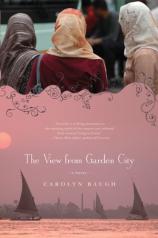Reading Group Guide
Discussion Questions
The View from Garden City

1. Afkar and Samira live periods of lies. Compare and contrast the lie that Afkar lives for the sake of her family with the lie that Samira lives for hers.
2. Huda and Yusriyya both enter into marriages with certain goals --- Huda, because she imagines it will bring peace to her home again, and Yusriyya because she believes it is a means to an end to help her family. Discuss their sacrifices.
3. Cutting is a major theme of the book, from female genital cutting to abortion, from Karima’s pain of losing Wagdy (“a portion of her soul sliced from her,”) to the metaphorical desire of Samira to cut her love for Hasan out of her heart. (Pages 194 and 314) Explore the intimate relationship between love and pain that inhabits the characters’ experiences.
4. At the novel’s beginning, Karima marvels at the narrator’s cool ability to leave her mother behind to strike out on her own. (Page 25) Discuss Karima’s relationship with her children. Have certain cultures been socialized to tame a mother’s love into more convenient structures, while others allow it free rein? Reflect on your own partings from your mother.
5. Discuss Karima’s relationship with her husband. What power does she hold?
6. It is Sulayman who rescues his daughter from clitoridectomy. (Page 164) Explore what might have propelled him to do so. Is it contradictory that he would also ask his wife to have an abortion? (Page 189) Why could he do so little to keep Huda from marrying a man she did not want?
7. Patriarchal culture is defined as culture that perpetuates power structures and traditions that serve male interests. What are some ways in which women become agents of patriarchal culture? What are some Western examples of this phenomenon?
8. Author Stephen R. Covey advised a man who came to him contemplating divorce because he wasn’t in love with his wife anymore: “love her,” he said, explaining to the man that most of love was a conscious decision coupled with effort, not a passive “falling.” Huda’s father tells her essentially the same thing in their private discussion about marriage. (Page 65) Discuss your own conceptions of love and marriage, and whether these observations hold any truth for you.
9. The narrator deliberately remains anonymous and attempts to observe without influencing, yet also attempts to absorb Cairo’s lessons. At the same time, she presumes to speak in the voice of the women about whom she writes, inhabiting them omnisciently. Explore this dichotomy.
10. Samira teaches Yusriyya to read. How significant is this in constructing notions of women’s empowerment in developing nations? What do you think is the role of Western women in empowering women globally? What do you think women from developing nations imagine the role of Western women to be, if any? Is there such a thing as sisterhood --- nationally, internationally?
11. Compare and contrast the fathers in the book. Discuss what it means for them to be fathers of daughters.
12. Afkar’s father is a gentle, sensitive man, immersed in a centuries-old literary tradition, inclined to music. Discuss his uncharacteristic rage at the story’s beginning. (Page 95) Explore the traditional frameworks in which he is trapped.
13. Much of the so-called “chaste” love poetry of medieval Arabia is said to have emerged out of the marginalization of the desert Arabs. The lack of political voice and submission to an authoritarian government found its expression in poetry characterized by doomed, death-craving lovers pining after each other to the point of madness. What elements of powerlessness and disenfranchisement are manifested in the characters of Garden City? How might the stories have differed in a different framework?
14. Words and language are a constant theme --- after all, the narrator is there to learn a language not her own. Discuss the relationship between learning the language of another culture and cultural understanding.
15. Afkar accuses the great poets of having lied to her, while at the book’s end, she insists that one does not know Arabic until one can read the great poets. (Pages 121 and 318) Investigate what propels humans to express themselves in verse and meter; in ink; in language.
16. Early in their relationship, Hasan searches in vain for language to encompass his emotions toward Samira. (Page 293) For her part, Samira little by little falls silent, unable to express herself with anyone but Hasan. Discuss the implications of these silences.
17. “My second son left me to live and work abroad, because he cannot make enough here to live better than a beggar,” says Karima. (Page 191) Does reflecting on America’s immigrant population as sons and daughters of pining mothers cause the issue to shift any in your consciousness?
18. “Is this it, then; is this what it looks like?” Samira asks herself in the Muqattam flat. (Page 305) What do you think she means?
19. Karima gives the narrator a look as if to say, “Do you think, perhaps, that you are more your own than I?” (Page 195) What does this mean? What does it take for a woman to have self-possession? Give an example of your own life where you’ve sacrificed, compromised, given yourself away --- what was the cause? Did you emerge strengthened or diminished?
The View from Garden City
- Publication Date: March 1, 2011
- Paperback: 336 pages
- Publisher: Forge Books
- ISBN-10: 0765321831
- ISBN-13: 9780765321831







